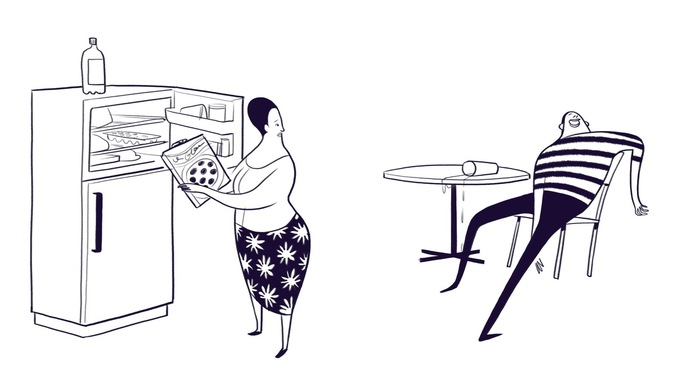How Do You Reward Your Loved One in These Circumstances?
If your Loved One is always high or drinking, how do you know when to step in with rewards, and when step away, remove rewards, and allow natural consequences when you suspect or see use? Well, it’s a lot harder, but it’s not impossible. It’s going to require that you build your skill at telling the difference between a lot of use and a little use. Let me explain…
A person who uses around the clock doesn’t do so at the same level all the time. There are periods when your Loved One is just maintaining and periods when they’re looking to get quite high. People who drink or drug around the clock often have periods when they take it easy (maybe they don’t have the money or can’t find their drug of choice, or maybe they have something later on in the day that they don’t want to mess up, like a court hearing or seeing their child). And, I’m sure you’ve seen it, there are times when your Loved One is bent on partying and getting really high or drunk (perhaps they shift to hard alcohol from beer, or it’s Friday, the weekend, and they bought their oxycodone to celebrate…..).
Watch for a Low Level of Use
The key is to learn how to distinguish between the two and reward them when you see a low level of use. That’s right, you are going to draw the line between use and non-use differently, with the line now falling between a lot of use/getting high/getting drunk and a little use/maintaining/not visibly high or drunk.
As you listen to and put into action Learning Module 5: My Loved One Is Not Using Right Now, Now What? and Learning Module 6: My Loved One Is Using Right Now, Now What?, draw your line through a lot and a little, step away and allow natural consequences when you see a lot of use (Learning Module 6) and reward when you see a little (Learning Module 5). When your Loved One is always using something, you are going to draw the line between using to get high or party and using a little just to maintain.
A Case Study
Here’s an example of what we mean from a mom we worked with…
“Catching my daughter not using is more complicated because she is abusing prescription opiates, which she is physically dependent on. I have noticed that she tries to clean up prior to seeing her probation officer, because he urine tests her, and before court dates. If she manages to stay free of drugs during these times, she is in an awful mood, literally physically withdrawing. There are other times however, where she occasionally can’t or won’t take her drugs, and wilfully tries to lower her use by buying suboxone on the street. For those of you who don’t know, suboxone is a prescribed drug that helps people get off opiates by substituting a small regular dose of an opiate along with an opiate blocker. It is easy to get this drug on the street and it is cheap. When she takes suboxone she is physically comfortable and not high.”
“I decided I would figure out ways to reward the times that she is on suboxone, essentially treating these times as moments of non-use. The first time I came home from work and she was acting and looking straight, I looked her in the eyes, gave her a big smile and told her I was glad to see her. She looked at me like I had two heads; she was suspicious. I said: “I don’t always act the way I should around you, and when I see you looking straight, I am so amazingly relieved and grateful – I just want you to know that.” She was uncomfortable by what I said and changed the subject by asking what was for dinner. She then went into the TV room until dinner and didn’t appear to take any drugs that evening. Had she looked high when I came home, I wouldn’t have said anything at all, and I wouldn’t have cooked dinner. I was glad I had expressed how I felt, and I think it made a little difference in her attitude that night.
My next attempt was more elaborate. I wanted to see if I could find a way for the two of us to spend a little quality time together the way we used to when she was young, before she had started using the pills. Our relationship has really deteriorated over the last year with the drug use. My daughter used to love to shop for bargains together. Yet we hadn’t been to the Mall in a long time. To pull this off, my best chance was to catch her first thing in the morning on a weekend, before she went out. Going out now means scoring and getting high. So if a) she was home to begin with in the morning and b) I could redirect her from going out, the chances were good she wouldn’t be high, just on suboxone.”
It took three weekends before I saw this happen AND that she looked straight. When it did happen, I spoke to her in the kitchen after she had had the all-important first cup of coffee. I told her I needed help picking out material for a new shower curtain. If she’d come with me to the Mall for an hour I’d enjoy hunting for a sale on a pair of pants for her or something else she might like. I had $50 we could spend. We’d be home by noon. I could tell she was on the fence about coming; she must have been thinking about using. I repeated that we’d take just an hour, and that she’d still have her afternoon free. She agreed. We spent this totally fun hour at the Mall together, and had a few laughs at some of the wild clothing we saw. I could cry telling you about it. We came home around 12:30 and my daughter didn’t go out immediately like she normally would have. She waited until the evening. In total, she spent all of Saturday day not high and we enjoyed each other. It was a blessing.”



